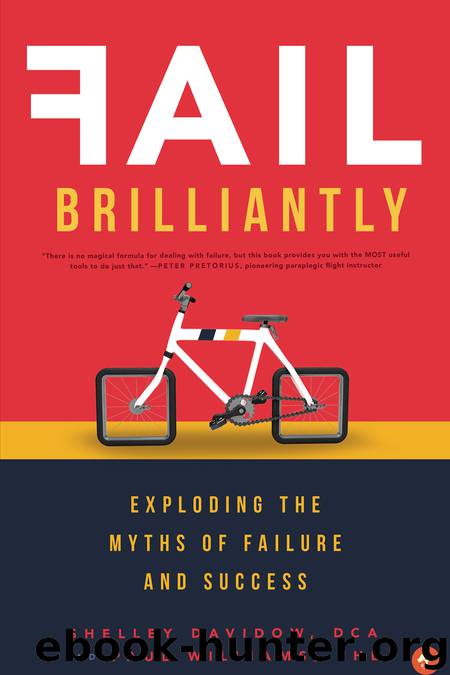Fail Brilliantly by Shelley Davidow

Author:Shelley Davidow
Language: eng
Format: epub
Publisher: Familius
Published: 2017-05-29T16:00:00+00:00
Chapter Seven
The Language of Failure
In 2013, the second–most used word on the internet was “fail” after error code 404, which means the same thing:
404 is the near-universal numeric code for failure on the global Internet, augmenting its original use as “page not found.” The single word fail is often used together with 404 to signify complete failure of an effort, project, or endeavor.1
The term 404 actually refers to a room number—it was in room 404 on the fourth floor that the first database, which was to become the World Wide Web, found its early home at CERN in Switzerland. Here, a group of enthusiastic young scientists and entrepreneurs created the error code way back in the dark ages of the 1990s.2 The world has added another connotation to the word failure, which has steadily been shifting in meaning for centuries. If we’re writing a whole book devoted to exploding the myth of failure, it makes sense to investigate the language of failure and the word itself, which have become a pervasive part of our lives.
A Brief History of Failure
Of the more than one million words in use in the English language and the almost 600 million people writing English content on the internet, fail and the concept of failure currently top the charts!
The word fail emerged in the 1200s from Old French falir, which meant “to be lacking,” “to come to an end,” “to be dying,” or “let down” and from the Latin fallere, which meant “to trip” or “cause to fall” in a literal sense and “to trick, dupe, cheat, be defective” in the figurative. Before the 1200s, the Old English word had been abreoðan, which meant “to perish” or “to be destroyed.” From about the early 1300s, the word fail meant “to run short of” and was used only to refer to goods, things, and foods. Beyond the mid-1300s, the word fail expanded to the failure of things and objects and meant “break down” or “go to pieces.” After the 1300s, the word sometimes referred to human experiences as well and meant “to suffer loss of vigour,” to “fail in courage,” or to “fail in strength.” It was in the late 1200s that the Anglo-French version of the word, failer, began to be used as the noun failure. Only in 1837 did the word come to be used as a broad term that defined a person, as in “he was a total failure.”3
This is significant because we can see over time how the word failure has evolved and shifted in its meaning and observe how it has entered the twenty-first century and the significant role it plays in all our lives. Less than two hundred years ago, you could not be termed a “failure.” Now we’re almost glued to the concept of being a success or a failure.
As we know, every living species has been competing and winning and losing the battle to exist for the whole of evolution. This pattern of trial and error is the model that underpins everything.
Download
This site does not store any files on its server. We only index and link to content provided by other sites. Please contact the content providers to delete copyright contents if any and email us, we'll remove relevant links or contents immediately.
Daring Greatly by Brene Brown(6512)
You Do You by Sarah Knight(4467)
Ikigai by Héctor García & Francesc Miralles(4274)
The Confidence Code by Katty Kay(4260)
He's Just Not That Into You by Greg Behrendt & Liz Tuccillo(3900)
The Courage to Be Disliked by Ichiro Kishimi & Fumitake Koga(3503)
Toxic Parents by Susan Forward(3292)
Make Your Bed by William H. Mcraven(3180)
Self-Esteem by Matthew McKay & Patrick Fanning(3144)
365 Days of Wonder by R.J. Palacio(2838)
The Gaslight Effect by Dr. Robin Stern(2793)
The Gifts of Imperfection by Brene Brown(2576)
Dare to Lead by Brené Brown(2458)
The Charisma Myth: How Anyone Can Master the Art and Science of Personal Magnetism by Cabane Olivia Fox(2446)
The Modern Alpha Male: Authentic Principles to Become the Man You Were Born to Be: Attract Women, Win Friends, Increase Confidence, Gain Charisma, Master Leadership, and Dominate Life - Dating Advice by Patrick King(2353)
How to Own Your Own Mind by Napoleon Hill(2295)
Parisian Charm School by Jamie Cat Callan(2292)
The Year of the Introvert by Michaela Chung(2288)
How to Make Small Talk by Melissa Wadsworth(2251)
